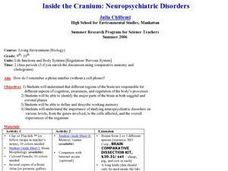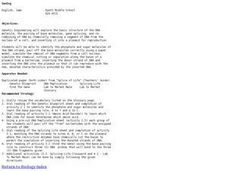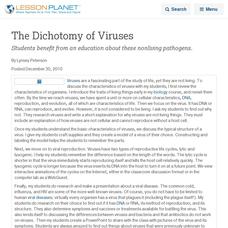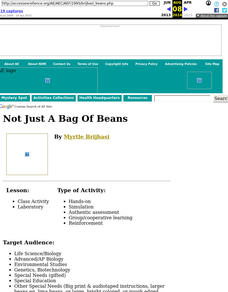Curated OER
Quick Breads: A Practical Application
Apply food selection and preparation guidelines related to quick breads, rice, grains, and pasta. National Standard 14.3.3 Identify basic cooking techniques related rice, grains, and pasta Identify examples of quick breads: muffins,...
Curated OER
Inside the Cranium: Neuropsychiatric Disorders
Students analyze different regions of the brain which are responsible for different aspects of cognition, awareness and regulating the body's process.
Curated OER
The Genome: Controversy for All Times
Students examine the genome and discuss the ethical and moral issues surrounding it. In groups, they discover the differences between ethics and morals and discuss where the concepts of good and bad come from in society. After reading...
Curated OER
Nucleic Acids and Protein Synthesis
Tenth graders complete a vocabulary assignment based on terms in the unit. They complete appropriate worksheets as each section of the unit is completed. They participate in classroom discussions. They construct a model of a DNA molecule.
Curated OER
How Do Flowering Plants Reproduce
Students investigate how flowering plants reproduce. They identify and describe the functions of the major sexual organs of a flower and fruit by examining and dissecting flowers and fruit.
Curated OER
What's Inside
Students become more familiar with life science in the context of the scientific method which helps them to become familiar with the various kinds of life science diagrams they may see on a GED science test.
Curated OER
Protein Synthesis Activities
Students participate in a teacher-guided activity to teach about protein synthesis. Student roles include one person as the DNA molecule, another is a single stranded sequence of complementary mRNA.
Curated OER
What Makes Bones Strong?
Students explore the function of bone, muscle, and skin. Pasta and rubber bands are used to model how minerals and collagen contribute to bone strength. The effects of the reduction of these substances are explored in chicken bones.
Curated OER
Pliable Proteins
Young scholars make models of protiens using wire and paperclips. They are given step by step instructions with lots of information about proteins throughout the directions. They make the three basic structual elements of proteins;...
Curated OER
Biology - Virus Modeling
Young scholars research one of the many types of viruses. They create a 3-D model of the virus they researched with graphics software.
Curated OER
Characteristics of Snakes and Turtles
Learners examine the characteristics of snakes and turtles and compare/contrast reptiles with mammals. They watch a video, answer discussion questions, complete information charts, conduct Internet research, and create a habitat diorama.
Curated OER
Light Microscopes
Seventh graders study the parts of a light microscope, and its proper use. They identify each part and explain why it is important to know how to use this tool. They practice observing newsprint on a wet mount slide.
Curated OER
Decisions Today for a Healthy Tomorrow
Students explore a variety of factors that affect the health of the bone, muscle, and skin systems. Healthy lifestyle recommendations which include behaviors over which we have control are explored in this lesson.
Curated OER
The Bottom Line
Seventh graders assume the role of stockholders in a fictitious biotech company. After investigating the cloning of pets, the effects of cloning on the health and well being of the cloned animal, and the ethical issues involved, groups...
Curated OER
Chemical Energy
In this science worksheet, students read about enzymes and nutrition. Students also answer 2 comprehension questions about the reading.
Curated OER
What Is Life?
In this life characteristics worksheet, students answer 16 questions about living things, Redi's experiment, basic needs, growth and development.
Curated OER
Genetics Challenge
In this genetics worksheet, students fill in the blanks with terms related to genes, alleles, genotypes, phenotypes and heredity. They use their answers to complete a joke.
Curated OER
GenEng
Students investigate the process of genetic engineering. In this genetic engineering lesson plan, students use paper models of DNA and plasmid bacterium to investigate the process of replicating DNA, splicing genes from DNA, and...
Curated OER
Inheritance Patterns in Zorks
In this inheritance patterns worksheet, students create a visual of a Zork using chromosome strips to represent alleles from the father and the mother to determine the traits in the offspring. Students translate the genotype to the...
Curated OER
18th Century Microscope
Students examine a microscope from the 18th century. In this microscope activity, students investigate how it works, what it was used for and how the tool has evolved through the years. Students also build knowledge on how compound...
Biology Junction
Fungi Coloring Worksheet
In this biology instructional activity, learners complete 28 short answer questions on fungi. They color and label the different parts of a hyphae.
Curated OER
The Dichotomy of Viruses
Students benefit from an education about these nonliving pathogens.
Curated OER
Not Just a Bag of Beans
Learners determine the types of natural selection and variation that exists in a population, using beans.
Curated OER
Biomechanics of Sports
Learners examine the body's major organ systems and how they function and influence each other. They examine how the human body moves when involved in sports.
Other popular searches
- Plant Cell Biology
- Inquiry Based Cell Biology
- Cell Biology Mitosis
- Cell Structure Powerpoint
- Cell Biology Meiosis
- Cell Structure and Function
- Cell Biology Vocabulary
- Label Cell Parts
- Grade 11 Cell Biology
- Cell Parts Pictures
- Cell Biology Activities
- Human Cell Biology

























